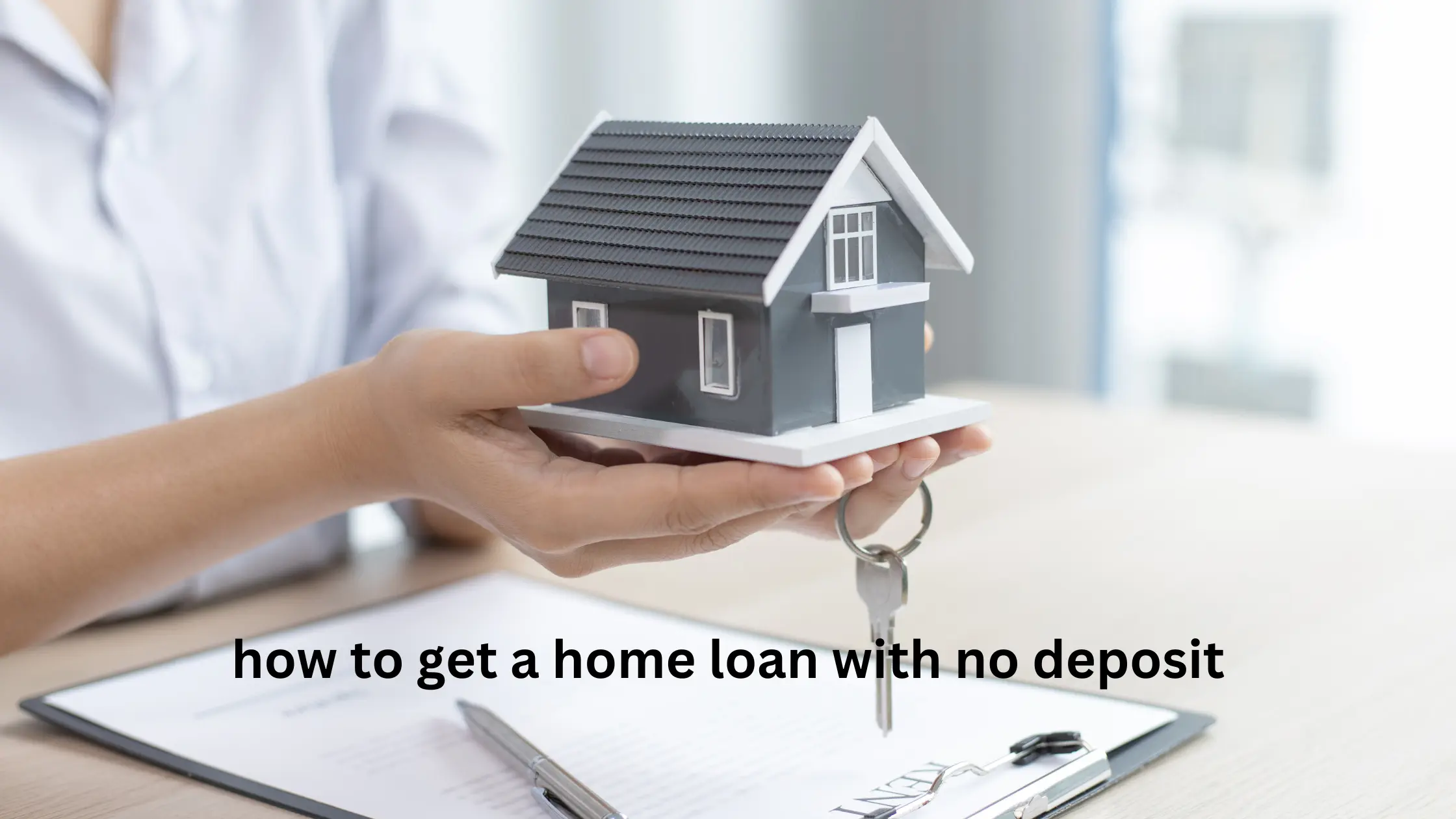Are you dreaming of owning a home but struggling to save up for a deposit? Don’t worry – you’re not alone. The good news is that it’s possible to get a home loan with no deposit or a very small one. In this comprehensive guide, we’ll explore various options and strategies to help you achieve your homeownership goals, even if you haven’t managed to save a traditional deposit.

VA Loans and USDA Loans
- VA Loans: If you’re a veteran, you might qualify for a VA loan with no down payment from the U.S. Department of Veterans Affairs. You’ll need good credit, sufficient income, and a Certificate of Eligibility from the VA. Perks include no down payment (as long as the sales price isn’t higher than the appraised value), no private mortgage insurance, and limited closing costs.
- USDA Loans: The United States Department of Agriculture offers loans with low interest rates to help low- or moderate-income individuals buy homes in rural areas. Two popular options are the single-family direct homeownership loan and the single-family guaranteed homeownership loan.
FHA Loans
- While not a no-money-down option, FHA loans allow for a down payment as low as 3.5% of the home’s purchase price. Lenders offering FHA loans are also restricted in the fees they can charge you.
Other Strategies
- First-Time Home Buyer Programs: Explore programs that cover the down payment for eligible buyers.
- Down Payment Gifts: Consider asking a family member for a down payment gift.
- Seller Concessions: Negotiate with the seller to cover some closing costs.
Understanding No-Deposit Home Loans
First, let’s clarify what we mean by a “no-deposit home loan.” Typically, when you apply for a mortgage, lenders expect you to contribute a deposit – usually around 20% of the property’s value. However, no-deposit loans allow you to borrow up to 100% of the property’s value or even more in some cases.
While these loans can be a great opportunity for many aspiring homeowners, they do come with some considerations. Let’s dive into the different ways you can secure a home loan with little to no deposit.
- Government Schemes and Grants
Many countries offer government-backed schemes to help first-time buyers enter the property market. These programs often allow you to purchase a home with a much smaller deposit than usual, or sometimes none at all.
For example:
- First Home Loan Deposit Scheme (Australia): This scheme allows eligible first-time buyers to purchase a home with as little as a 5% deposit, with the government guaranteeing up to 15% of the property’s value.
- Help to Buy Equity Loan (UK): The government lends you up to 20% (40% in London) of the cost of a newly built home, so you only need a 5% cash deposit and a 75% mortgage to make up the rest.
- FHA Loans (USA): These loans, backed by the Federal Housing Administration, allow you to buy a home with as little as a 3.5% down payment.
Check with your local housing authority or a mortgage broker to find out what schemes are available in your area.
- Family Guarantee Loans
Family guarantee loans, also known as family pledge loans, allow a family member (usually parents) to use the equity in their own home as security for a portion of your loan. This can help you avoid paying a deposit or significantly reduce the amount you need to save.
Here’s how it typically works:
- Your family member offers their property as additional security for your loan.
- This security covers 20% of your new property’s value.
- You borrow the remaining 80% as a standard home loan.
Keep in mind that this option comes with risks for your guarantor. If you can’t make your repayments, their property could be at risk.
- Lenders Mortgage Insurance (LMI)
While not strictly a no-deposit option, Lenders Mortgage Insurance can help you get a home loan with a much smaller deposit than is usually required. LMI protects the lender if you default on your loan, allowing them to lend you a higher percentage of the property’s value.
With LMI, you might be able to borrow up to 95% of the property’s value, meaning you only need a 5% deposit. However, remember that you’ll need to pay for the LMI, which can be a significant cost.
- Personal Loans for Deposits
Some lenders may allow you to use a personal loan to cover your deposit. This means you’re essentially borrowing 100% of the property’s value – part as a personal loan and the rest as a mortgage.
While this can be a way to get into the property market sooner, it comes with risks:
- You’ll be paying two loans simultaneously, which can strain your finances.
- Personal loans usually have higher interest rates than mortgages.
- Some lenders may view this negatively when assessing your mortgage application.
- Gifts from Family or Friends
If you’re fortunate enough to have family or friends willing to help, they might gift you the money for a deposit. Many lenders accept gifted deposits, but they’ll usually want confirmation that it’s a genuine gift and not a loan that needs to be repaid.
- Rent-to-Own Schemes
Also known as lease options, these schemes allow you to rent a property with the option to buy it later. Part of your rent goes towards building up a deposit. While this can be a path to homeownership, make sure you understand the terms and get legal advice before committing.
Also see: 2023 Hyundai Tucson Insurance Cost
Options for No Deposit Home Loans
- Guarantor Loans
- What is a Guarantor Loan? A guarantor loan involves having a family member or friend guarantee your loan by using their property as security. This reduces the risk for the lender and can help you secure a loan without a deposit.
- How it Works The guarantor provides a guarantee for a portion or the entirety of the loan. If the borrower defaults, the guarantor’s property may be used to cover the debt.
- Pros and Cons
- Pros: Easier approval, no deposit needed, potential for lower interest rates.
- Cons: Significant risk for the guarantor, potential strain on relationships, limited to those with willing and financially secure guarantors.
- Lender’s Mortgage Insurance (LMI)
- What is LMI? LMI protects the lender if the borrower defaults on the loan. It is usually required when borrowing more than 80% of the property’s value.
- How it Works Instead of a deposit, the borrower pays a one-time LMI premium, either upfront or capitalized into the loan amount.
- Pros and Cons
- Pros: Lower initial cost, easier to get into the property market.
- Cons: Higher overall loan cost, additional monthly repayments, potentially higher interest rates.
- First Home Owner Grants and Schemes
- What Are These Schemes? Many governments offer grants and schemes to help first-time homebuyers. These can include grants, stamp duty concessions, and shared equity schemes.
- How it Works Eligibility criteria vary by region, but these schemes can significantly reduce the upfront cost of purchasing a home.
- Pros and Cons
- Pros: Financial assistance, reduced upfront costs, potential for favorable loan terms.
- Cons: Limited to first-time buyers, regional restrictions, potential for additional paperwork.
Tips for Securing a No-Deposit Home Loan
- Improve your credit score: A strong credit history can make lenders more willing to offer you a no-deposit loan.
- Demonstrate stable income: Lenders want to see that you can afford the repayments. A steady job and consistent income will work in your favor.
- Reduce existing debts: Pay down credit cards and personal loans to improve your debt-to-income ratio.
- Save for associated costs: Even with a no-deposit loan, you’ll need to cover other expenses like legal fees and moving costs.
- Shop around: Different lenders have different policies. A mortgage broker can help you find the best deal.
- Be realistic: Make sure you can afford the repayments in the long term, not just right now.

Comparative Table of No Deposit Home Loan Options
| Option | Description | Pros | Cons |
|---|---|---|---|
| Guarantor Loans | Family/friend guarantees the loan using their property as security | Easier approval, no deposit needed, potential for lower interest rates | Significant risk for the guarantor, potential strain on relationships, limited to willing guarantors |
| Lender’s Mortgage Insurance (LMI) | Financial assistance reduced upfront costs, potential for favorable loan terms | Lower initial cost, easier to enter the market | Higher overall loan cost, additional monthly repayments, potentially higher interest rates |
| First Home Owner Grants/Schemes | Government assistance for first-time homebuyers | Limited to first-time buyers, regional restrictions, the potential for additional paperwork | Limited to first-time buyers, regional restrictions, potential for additional paperwork |
FAQs
Q1: Is it possible to get a home loan with no deposit? Yes, it is possible through options like guarantor loans, LMI, and first-home-owner grants and schemes.
Q2: What is a guarantor loan? A guarantor loan involves a family member or friend using their property as security for your loan, reducing the risk for the lender.
Q3: What are the risks for a guarantor? If the borrower defaults, the guarantor may be responsible for repaying the loan or risk losing their property.
Q4: What is Lender’s Mortgage Insurance (LMI)? LMI is insurance that protects the lender if the borrower defaults. It is typically required when borrowing more than 80% of the property’s value.
Q5: Are there any government grants for first-time homebuyers? Yes, many governments offer grants and schemes to assist first-time homebuyers, which can help reduce upfront costs.
Q6: What are the pros and cons of no-deposit home loans?
- Pros: Easier access to homeownership, lower initial costs.
- Cons: Higher overall loan costs, potential strain on relationships if using a guarantor, stricter lending criteria.
Conclusion
While getting a home loan with no deposit can be challenging, it’s not impossible. There are various options available, from government schemes to family assistance and alternative loan structures. However, it’s crucial to carefully consider the long-term implications of these options.
Remember, just because you can get a no-deposit loan doesn’t always mean you should. Make sure you can comfortably afford the repayments and consider the total cost of the loan over its lifetime. It’s always wise to speak with a financial advisor or mortgage broker to understand which option best suits your circumstances.
Getting a home loan with no deposit is achievable, but it requires research, eligibility, and understanding of your options. Remember to consult a mortgage professional to find the best fit for your situation. Happy house hunting! 🏡🔑

Alisha Ray is the founder and chief editor of MoneyCocktail.com, a leading resource for finance, insurance, and share market insights. With a passion for empowering individuals to make informed financial decisions, Alisha combines her extensive knowledge and practical experience to provide clear, actionable advice.

